Filtered By: Newstv
NewsTV
Loleng's Hu Tieu-an: Former refugee camp worker owns Vietnamese carinderia in Bataan
By Cristina Tantengco
For more travel tips from Drew Arellano's weekly budget travel show, follow the Biyahe ni Drew Facebook Page and Twitter account! "Biyahe ni Drew" airs Fridays at 8:00 p.m. on GMA News TV.
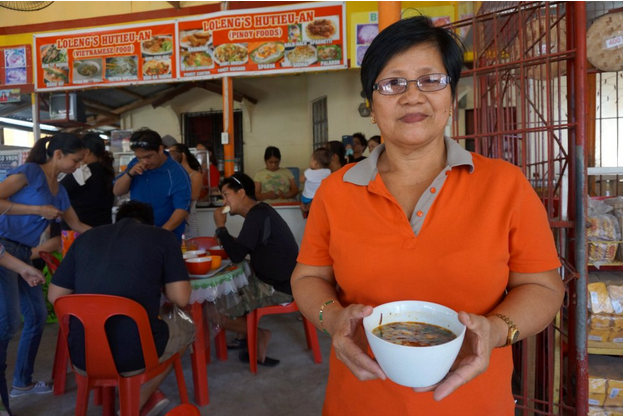
In Bataan and in need of a tasty, affordable meal? Make like a local and head to Loleng’s Hu Tieu-an.
When people think of Vietnamese food, you can bet that a roadside eatery in Morong, Bataan isn’t the first thing that comes to mind. Yet Loleng’s Hu Tieu-an, a humble roadside eatery run by a Filipina who used to work in a refugee camp, has been delighting people with Vietnamese noodles for over 15 years.
Loleng’s hu tieu, or rice noodles in a golden brown pork broth, are tasty and affordable — a step up from the usual chicken mami, but at first glance isn’t really anything to write home about. However, what sets Loleng’s Hu Tieu-an apart from the other carinderias is the backstory behind each bowl of soup.
Behind each bowl of noodles
When refugees of the Second Indochina War (also known as the Vietnam War) came to the Philippines in the 1970s and 80s, the Philippine Refugee Processing Center (PRPC) in Bataan was their last stop in a long and arduous journey. In fleeing Vietnam aboard small fishing vessels, the so-called “boat people” faced not only the natural dangers of the open sea, but threats from pirates who would board their boats, take their food and rape the women.
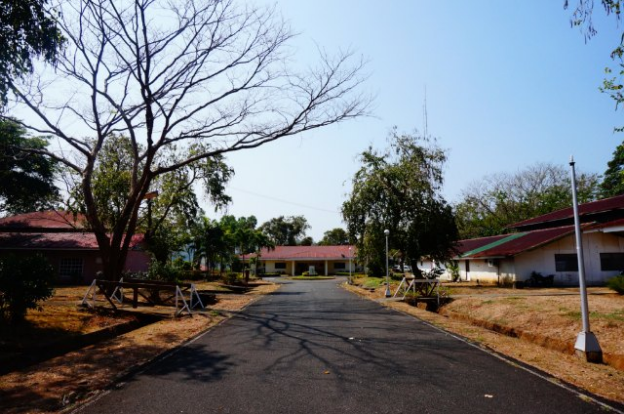
The PRPC, opened in 1980, prepared the Vietnamese, Cambodian, and Laotian refugees for repatriation to Western countries. It was like a city in itself. There were bunkhouses, schools, language centers where the refugees studied English, hospitals and markets employing Filipino workers, as well as places of worship for four religions.
When the last of the refugees left in the 1990’s, the PRPC fell into disrepair and closed. Today, it has been refurbished and is being used as a venue for corporate training; with a makeshift museum on the Indochina War and the refugees as a reminder of its past.
But this is not the only mark that the refugees have left on the place they once called home. The Vietnamese friends Loleng made at the camp taught her how to cook, and the recipes stayed with her long after they had left.
Vietnamese on a budget
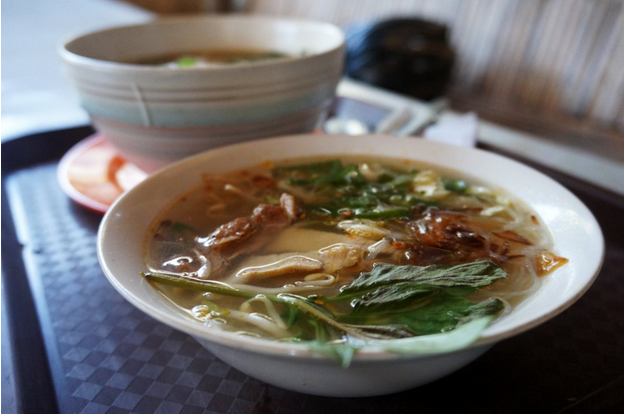
Loleng’s Hu Tieu-an opened in the 1990’s and gets its name from its most popular offering: Hu Tieu. The hearty noodle soup is thought to have originated from the ethnic Chinese settlers in Southeast Asia, which may explain why its golden brown broth is more savory than the traditionally Vietnamese pho.
Flavored with pork and topped with a handful of garlic and leeks, Loleng’s Hu Tieu is available with Vietnamese rice noodles (P50 a bowl) or plain noodles (P35). You can also try a Filipinized version of the classic Vietnamese sandwich banh mi (P45), which uses simple buns instead of the traditional French bread. Because of these tweaks to the Vietnamese recipes, Loleng is able to serve as many people as she can in the quiet province.
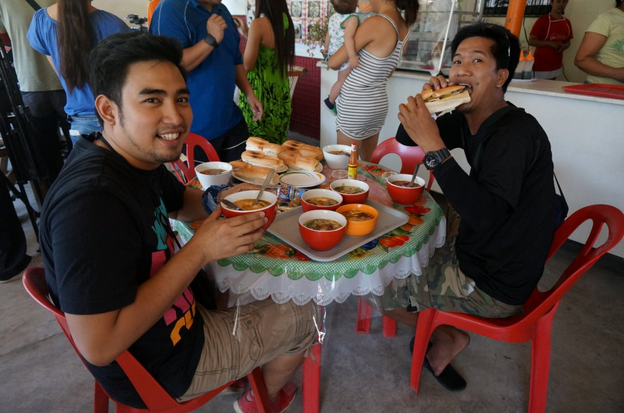
There are also Filipino dishes in Loleng’s eatery, such as chicken mami, pancit palabok, and the “spabok”, or spaghetti noodles topped with pansit palabok sauce. On any given day, you’ll see groups of friends or families loading up their tables with a mix of Filipino and Vietnamese dishes.
A diverse crowd
It’s not just locals of Morong, Bataan who frequent Loleng’s Hu Tieu-an, but also visiting cyclists from Metro Manila. For triathletes like Drew Arellano, host of GMA News TV’s “Biyahe ni Drew,” Loleng’s is a pit stop along their training route: a place to fuel up with a simple, filling meal before hitting the road once more.
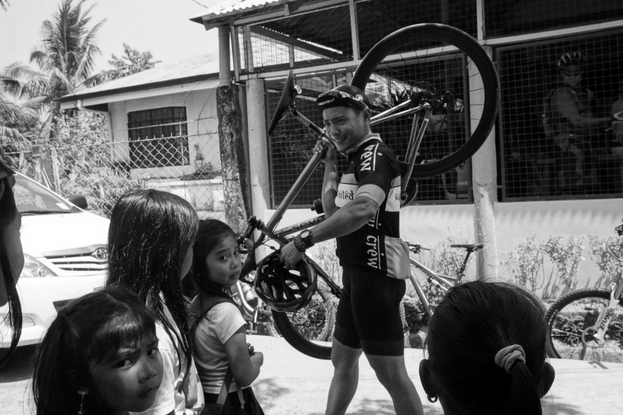
These guys add P5 to top their hu tieu with a hardboiled egg; while in the afternoon, you can see students passing by Loleng’s on the way home to hang out and have merienda.
Some of Loleng’s diners come every day: “Ang sarap eh,” according to a woman interviewed by “Biyahe ni Drew.” “I’ve been to Vietnam and for me, comparable ang lasa nito sa hu tieu nila roon.” If you’re wondering why, it’s because Loleng learned the recipes from the Vietnamese friends she made at the PRPC.
Whether you’re an athlete, student or passing tourist, be sure to visit Loleng’s Hu Tieu-an when you’re in Morong, Bataan. Great food aside, it’s a quiet reminder that amid tragic times of global conflict, ordinary people from different cultures crossed paths and became friends.
–PF/GMA News

In Bataan and in need of a tasty, affordable meal? Make like a local and head to Loleng’s Hu Tieu-an.
When people think of Vietnamese food, you can bet that a roadside eatery in Morong, Bataan isn’t the first thing that comes to mind. Yet Loleng’s Hu Tieu-an, a humble roadside eatery run by a Filipina who used to work in a refugee camp, has been delighting people with Vietnamese noodles for over 15 years.
Loleng’s hu tieu, or rice noodles in a golden brown pork broth, are tasty and affordable — a step up from the usual chicken mami, but at first glance isn’t really anything to write home about. However, what sets Loleng’s Hu Tieu-an apart from the other carinderias is the backstory behind each bowl of soup.
Behind each bowl of noodles
When refugees of the Second Indochina War (also known as the Vietnam War) came to the Philippines in the 1970s and 80s, the Philippine Refugee Processing Center (PRPC) in Bataan was their last stop in a long and arduous journey. In fleeing Vietnam aboard small fishing vessels, the so-called “boat people” faced not only the natural dangers of the open sea, but threats from pirates who would board their boats, take their food and rape the women.

The PRPC, opened in 1980, prepared the Vietnamese, Cambodian, and Laotian refugees for repatriation to Western countries. It was like a city in itself. There were bunkhouses, schools, language centers where the refugees studied English, hospitals and markets employing Filipino workers, as well as places of worship for four religions.
When the last of the refugees left in the 1990’s, the PRPC fell into disrepair and closed. Today, it has been refurbished and is being used as a venue for corporate training; with a makeshift museum on the Indochina War and the refugees as a reminder of its past.
But this is not the only mark that the refugees have left on the place they once called home. The Vietnamese friends Loleng made at the camp taught her how to cook, and the recipes stayed with her long after they had left.
Vietnamese on a budget

Loleng’s Hu Tieu-an opened in the 1990’s and gets its name from its most popular offering: Hu Tieu. The hearty noodle soup is thought to have originated from the ethnic Chinese settlers in Southeast Asia, which may explain why its golden brown broth is more savory than the traditionally Vietnamese pho.
Flavored with pork and topped with a handful of garlic and leeks, Loleng’s Hu Tieu is available with Vietnamese rice noodles (P50 a bowl) or plain noodles (P35). You can also try a Filipinized version of the classic Vietnamese sandwich banh mi (P45), which uses simple buns instead of the traditional French bread. Because of these tweaks to the Vietnamese recipes, Loleng is able to serve as many people as she can in the quiet province.

There are also Filipino dishes in Loleng’s eatery, such as chicken mami, pancit palabok, and the “spabok”, or spaghetti noodles topped with pansit palabok sauce. On any given day, you’ll see groups of friends or families loading up their tables with a mix of Filipino and Vietnamese dishes.
A diverse crowd
It’s not just locals of Morong, Bataan who frequent Loleng’s Hu Tieu-an, but also visiting cyclists from Metro Manila. For triathletes like Drew Arellano, host of GMA News TV’s “Biyahe ni Drew,” Loleng’s is a pit stop along their training route: a place to fuel up with a simple, filling meal before hitting the road once more.

These guys add P5 to top their hu tieu with a hardboiled egg; while in the afternoon, you can see students passing by Loleng’s on the way home to hang out and have merienda.
Some of Loleng’s diners come every day: “Ang sarap eh,” according to a woman interviewed by “Biyahe ni Drew.” “I’ve been to Vietnam and for me, comparable ang lasa nito sa hu tieu nila roon.” If you’re wondering why, it’s because Loleng learned the recipes from the Vietnamese friends she made at the PRPC.
Whether you’re an athlete, student or passing tourist, be sure to visit Loleng’s Hu Tieu-an when you’re in Morong, Bataan. Great food aside, it’s a quiet reminder that amid tragic times of global conflict, ordinary people from different cultures crossed paths and became friends.
–PF/GMA News
More Videos
Most Popular



